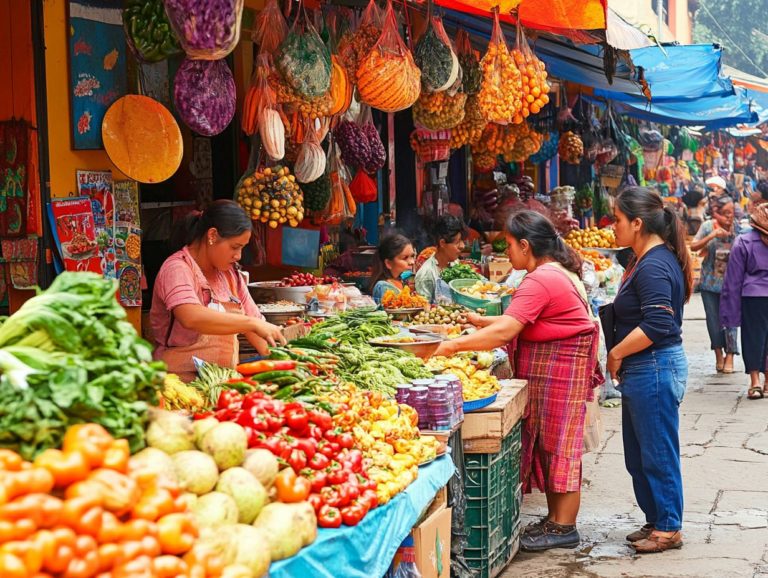Exploring Local Food Markets: A Budget Guide
Discover the vibrant world of local food markets! These lively hubs offer a unique shopping experience that goes beyond the usual grocery store.
This exploration reveals the myriad benefits of shopping at these markets, from the unparalleled freshness and quality of produce to the positive impact on the local economy.
You ll uncover budget-friendly tips for navigating these markets, strategies for securing the best deals, and an introduction to various types of local food markets, including farmers markets and Community Supported Agriculture, or CSA, which allows you to buy a share of a farm’s produce.
Embrace the bounty of local food and empower your shopping choices!
Contents
- Key Takeaways:
- Benefits of Shopping at Local Food Markets
- Supporting Local Economy
- Navigating Local Food Markets on a Budget
- Tips for Smart Shopping
- Finding the Best Deals at Local Food Markets
- Comparison Shopping
- Exploring Different Types of Local Food Markets
- Frequently Asked Questions
- How can I save money at local food markets?
- What types of food can I find at local markets?
- How do I know which local food markets to visit?
- Is bargaining acceptable at local food markets?
- Are there any tips for staying within budget while exploring local food markets?
- Can I support local farmers and businesses by shopping at food markets?
Key Takeaways:

What are Local Food Markets?
Local food markets, like farmers markets, are vibrant hubs of community life where you can access fresh produce, organic fruits, and seasonal delights straight from local farms.
In the heart of a warm Indiana summer, these markets provide a unique chance to soak in the fresh air while championing the local food movement. Here, you can connect with community gardens and food co-ops.
They build strong relationships between farmers and consumers, ensuring that what you buy is not only fresh but also of exceptional quality, enhancing your shopping experience.
These markets promote food quality and sustainability by highlighting the advantages of purchasing seasonal foods. These foods are grown under optimal conditions and have a smaller carbon footprint thanks to reduced transportation needs.
By uniting local farms with community members, they not only support local businesses but also enlighten you about the significance of sourcing food locally. Visiting these markets inspires community engagement and strengthens the connections among residents, fostering a shared commitment to healthier eating and sustainable practices.
Local food markets truly create a nurturing space for fresh, nutritious food, helping you connect with your community and understand your food choices better.
Benefits of Shopping at Local Food Markets
Shopping at local food markets presents a wealth of advantages, from gaining access to fresh, high-quality produce to bolstering the local economy and community-supported agriculture initiatives.
These markets offer budget-friendly options that are essential for healthy aging, giving you the power to make informed choices about your diet. By emphasizing seasonal values and providing valuable nutrition tips, local food markets cultivate an environment that encourages and supports healthy lifestyles.
Freshness and Quality
One of the standout advantages of shopping at local food markets is the unparalleled freshness and quality of the produce you find there, including organic fruits and fresh vegetables. Local vendors often prioritize the Clean Fifteen and Dirty Dozen guidelines, demonstrating their commitment to offering food that is not only nutritious but bursting with flavor.
This dedication to food freshness and quality goes far beyond mere appearance; it includes rigorous testing for pesticide residues and the adoption of sustainable farming practices. By embracing these measures, local vendors ensure that you receive not just superior taste but also the myriad health benefits that come with consuming organic options. Eating fresh produce can significantly boost your immunity and enhance your overall well-being, making it an essential component of a balanced diet.
By supporting local markets, you re not just enjoying wholesome and green food; you re also strengthening community ties and contributing to a more vibrant local economy.
Supporting Local Economy

Supporting local food markets boosts the local economy. This creates a thriving cycle that benefits both farmers and consumers.
When you use SNAP (Supplemental Nutrition Assistance Program) or EBT (Electronic Benefits Transfer) cards at these markets, you gain access to fresh, high-quality produce while simultaneously sustaining community-supported agriculture. This often includes farmer discounts and promotes effective food budgeting.
This practice empowers local farmers by ensuring they receive fair compensation for their goods. This allows them to reinvest in their farms.
As more individuals and families choose to shop at these markets, the demand for local, seasonal products increases. This, in turn, strengthens economic ties within the community.
These interactions foster meaningful relationships between consumers and producers, enhancing trust and encouraging transparency in food sourcing. By prioritizing local purchases, you actively support sustainable practices that benefit not only your health but also the economic vitality of your community.
Navigating local food markets on a budget can be a delightful experience! You can enjoy sampling local delicacies on a budget while discovering budget-friendly options without sacrificing quality or freshness.
Armed with strategic shopping tips, you can elevate your outing by engaging with vendors. Don your comfortable shoes for those long strolls, and prepare to shop with cash to snag the best deals available.
Tips for Smart Shopping
Smart shopping at local food markets requires a blend of strategic planning and flexibility. This gives you the power to maximize your shopping experience.
By crafting a flexible list centered on seasonal offerings and embracing the spontaneity of cash shopping, you open yourself up to delightful discoveries of fresh produce and unique food co-ops.
When you prioritize what s in season, you often find superior quality and flavor at competitive prices. This strategy ignites your creativity in the kitchen and lends support to local farmers.
Allowing a bit of spontaneity during your shopping trip invites you to explore new ingredients that could inspire unique dishes. Engaging with food co-ops or smaller vendors may lead you to specialty items that enhance your meal preparation.
Ultimately, these effective shopping strategies result in a more fulfilling experience. You not only save money but also cultivate a deeper connection with your food and the community around you.
Finding the Best Deals at Local Food Markets
Finding the best deals at local food markets demands a careful eye for comparing prices. This allows you to make informed choices about where to buy seasonal foods and fresh produce.
By actively seeking vendor recommendations and familiarizing yourself with market hours, you can take full advantage of farmer discounts and truly maximize your savings.
Comparison Shopping

Comparison shopping at local food markets can be an enriching experience! Savor the fresh air while assessing the quality of food from various vendors.
By focusing on organic fruits and engaging with the sellers, you gain a deeper understanding of the true value of your purchases. This approach heightens your appreciation for fresh produce.
Interacting with different sellers provides you with insights into their sourcing practices, the farming methods they use, and the nutritional benefits of seasonal items.
Such conversations empower you to weigh your options, compare costs, and ensure that you receive products that are not just delicious, but also in harmony with your culinary standards.
Ultimately, comparison shopping fosters a sense of community. This enhances your shopping experience while promoting sustainable food choices.
Don t wait! Visit your local food market this weekend and taste the difference!
Exploring Different Types of Local Food Markets
Exploring the various types of local food markets unveils a rich array of options at your fingertips, ranging from vibrant farmers’ markets to community-supported agriculture initiatives.
These markets are essential to the local food movement, serving not only as sources of fresh produce but also as lively venues for outdoor events that foster community engagement and strengthen connections to local farms.
Farmers’ Markets
Farmers’ markets emerge as essential community hubs, offering fresh air and a direct connection to seasonal foods crafted by local farmers. They play a crucial role in the community, promoting gardens and fostering meaningful relationships between consumers and producers.
These markets offer a wide selection of nutritious fruits and vegetables. They empower you to make informed food choices while supporting sustainable agricultural practices.
As you wander through the stalls, you’ll be thrilled to find artisanal delights like handmade cheeses, fresh-baked goods, and organic herbs, all enhancing your cooking experiences.
By bringing together residents and local artisans, these markets cultivate community engagement, encouraging social interactions that strengthen neighborhood ties. When you participate in these vibrant events, you re not just purchasing food; you re investing in a lively economy fueled by the passion and dedication of nearby farmers and makers.
Community Supported Agriculture (CSA)
Community Supported Agriculture (CSA) provides a unique way to access fresh produce by connecting you directly with local farms. This model offers budget-friendly options and enhances food security and overall health from the foods you eat by delivering seasonal selections right to your doorstep.
By linking you and your family with farmers in your community, CSA fosters a sense of belonging and encourages your active participation in the local agricultural landscape. This relationship supports local businesses while minimizing the carbon footprint associated with transporting food.
As a member, you often gain access to valuable educational resources about nutrition and sustainable farming practices, promoting healthier lifestyle choices. The engagement fostered through CSA programs allows you to share recipes and create a vibrant network centered around wholesome, locally sourced foods.
Frequently Asked Questions

How can I save money at local food markets?
Yes, exploring local food markets can be a budget-friendly way to try new foods and support small businesses. For more tips on this, check out how to find budget-friendly local cuisine. By purchasing from local vendors, you can often find lower prices compared to grocery stores or restaurants.
What types of food can I find at local markets?
You can find a variety of fresh produce, meats, dairy products, baked goods, and specialty items at local food markets. Many markets also offer prepared foods and snacks, allowing you to have a quick and affordable meal on the go.
How do I know which local food markets to visit?
Research the food markets in your area to find out which ones have the best selection and prices. You can also ask friends or family for recommendations or explore online reviews to get an idea of the market’s atmosphere and offerings.
Is bargaining acceptable at local food markets?
It depends on the market and the vendor. Some may be open to bargaining, while others have set prices. It’s always best to ask politely if they are willing to negotiate before making a purchase.
Are there any tips for staying within budget while exploring local food markets?
- Bring cash to stick to a set budget.
- Have an idea of what you want to buy beforehand.
- Compare prices between different vendors.
- Avoid impulse buys and only buy what you can consume before it goes bad.
Can I support local farmers and businesses by shopping at food markets?
Absolutely! By purchasing from local food markets, you are directly supporting small businesses and local farmers. This not only helps the economy but also promotes sustainable and ethical practices within the community.
So, why not visit your local food market this weekend? Support your community and enjoy fresh food!






